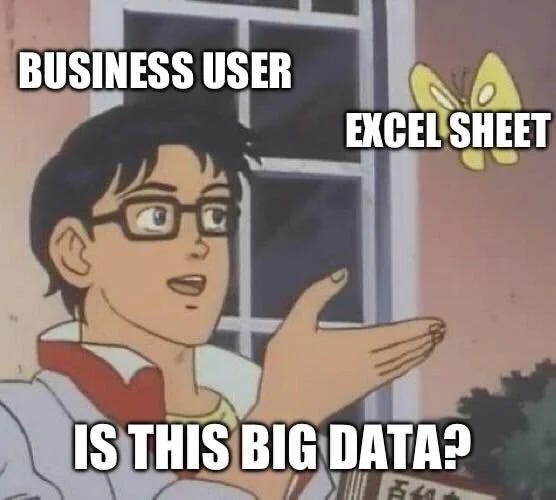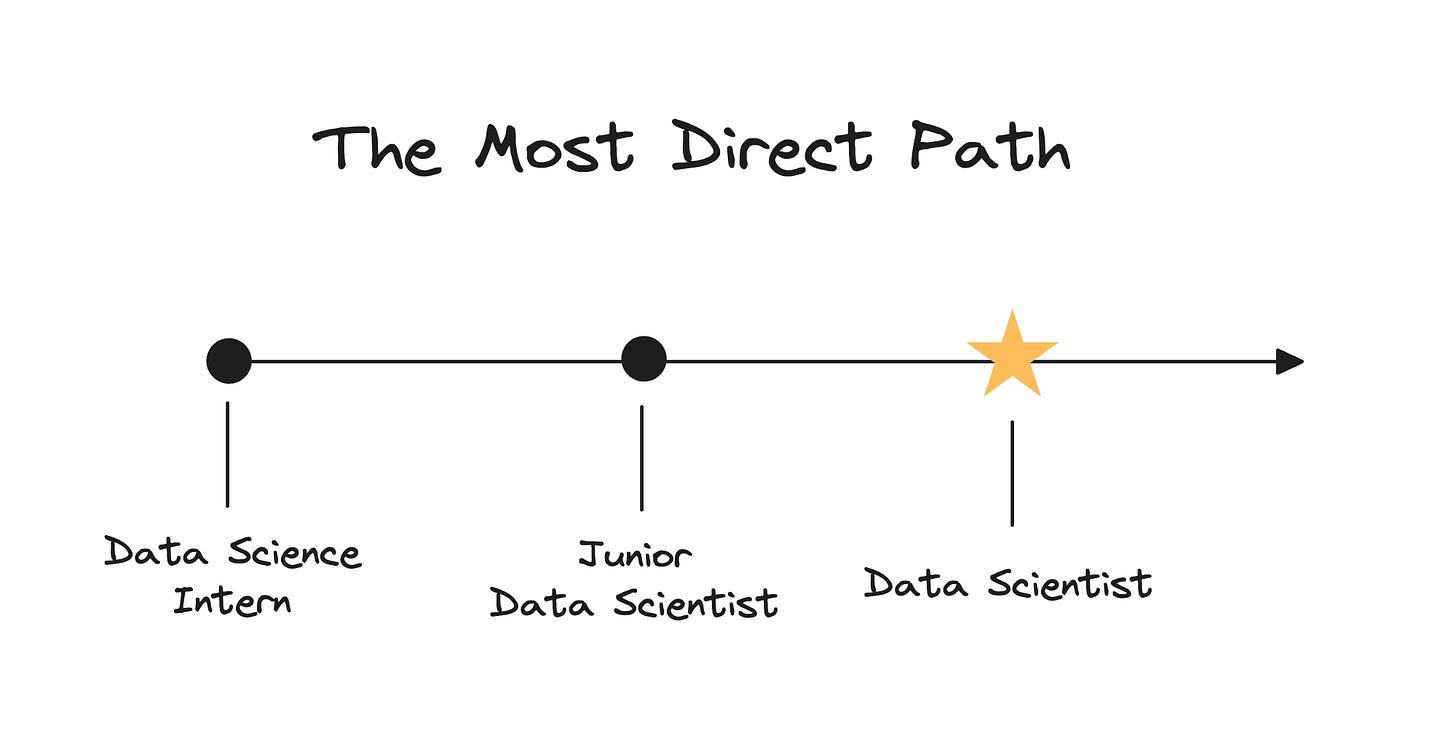If you are just entering the job market, the best piece of advice I can give you is that taking any data job available is a poor career move.
This doesn’t mean you should limit yourself to only accepting a 'Data Scientist' title straight out of university (or BootCamp) though.
This is a mistake you can’t afford to make, especially in this current job market.
So where is the sweet spot? How can you be strategic about your early career moves without limiting your opportunities? And most importantly, how can you avoid jobs that will only limit your growth?
After all, none of us want to be stuck in a job we hate, being forced to pretend that Excel is a real database and making countless pivot tables that no one will ever use.

So in this article, I will give you a clear career roadmap you can follow to a successful career in Data Science.
This is what we have on the agenda for today:
The Most Direct Path
The “Other” Data Job Titles
The Alternative Path (My Path)
Key Takeaways
The Most Direct Path
If I had to paint a picture of the most ideal scenario, then this is what that masterpiece would look like:
You get an internship straight out of university, and work your ass off for 6 months or so, so that you get offered a full-time position as a junior Data Scientist. After about a year or so of learning the ropes, you upgrade to that precious title of Data Scientist you’ve been dreaming about for so long.
During the past 6 years of working in Data & Analytics, I have seen multiple people successfully follow this roadmap to become a Data Scientist. Some were graduate students, others undergrads, and one of them a BootCamp graduate.
Long story short, it works!
Is this actually the most direct path?
You may be asking yourself, isn’t the most direct path actually landing an entry-level Data Scientist role straight out of university? and you are correct, but there 2 things you need to consider:
The reality is that unless you have a master’s degree in Data Science (or similar major) you’ll have a difficult time landing your first entry-level Data Science role straight out of university.
Although I’ve seen graduate students successfully do this—even worked with a few of them—it is still very difficult to convince hiring managers to consider you seriously without any actual work experience.
The “Other” Data Job Titles
Only accepting a “Data Scientist” job title straight out of university will not only limit your employment opportunities, but given the state of the job market, it may even keep you unemployed for a while.
There are other data job titles you shouldn’t ignore during your job search. But given the vast number of options available, it’s easy to feel overwhelmed and make the wrong career moves.
To help you navigate these choices, here’s a list of roles you should keep an eye on:
I need you to consider two things before you take this list and run with it:
While I’m not claiming one job title is inherently superior to another, those highlighted are preferable since they have the greatest overlap with Data Science, making it easier to transition later on. Unlike the crossed-out job titles, these are likely to be perceived by hiring managers and recruiters as having the most relevant skills and experience needed for a Data Scientist role.
Regardless of the title, always read the job description thoroughly to ensure it meets your career development standards. There are lots of Data Analyst jobs out there where all you’ll be doing is building Excel reports, and if your goal is to later transition into Data Science, then this will do very little for your career development.
So what should you be looking out for, roughly?
Data Analyst: Focuses on processing and cleaning data and often provides actionable insights through reports and visualizations.
Analytics Engineer: Works between Data Engineers and Analysts/Data Scientists. Provides the data infrastructure and tools necessary for analysis like building data pipelines and ensuring data quality.
Best suited for those with a background in Database management or Software engineering.
Business Analyst (Aka Business Intelligence Analyst): Works closely with business development teams. Similar to Data Analysts although they tend to focus more heavily on recommending solutions for business needs.
Best suited for those with a background in Business Development, Sales, or Marketing.
Product Analyst: Works closely with product managers and developers. Helps drive product development and enhance user experience based on data-driven insights
Best suited for those with a background in Product Management or Software Development.
For any of these roles, what’s also extremely important (aside from the specific responsibilities outlined above) to look for is that you’ll be using relevant tools and skills. For more information on which tools and skills are most relevant for Data Science, check out this Data Job Market Report.
The Alternative Path (My Path)
I tend to advocate for the alternative path so strongly for two main reasons:
The fastest path isn't necessarily the most educational one. Rushing into a data science role without a solid foundation can lead to challenges and gaps in essential skills.
Breaking into data science without relevant work experience is quite difficult. Starting as a data analyst, for example, could provide practical experience and a deeper understanding of data, which are crucial for a successful transition into a data scientist role.
And of course, I’m speaking from personal experience because my path wasn’t the most direct one:
I graduated from university with a B.S. in Computer Science and a specialization in Machine Learning and landed my first full-time job as a Data Analyst shortly after graduation. About a year later, I started a new role as a Business Analyst. And after working for about 2 years as a Business Analyst, I went on to land my role as a Data Scientist.
How did that shape me?
As a Data Analyst, I became so good at “wrangling“ large and messy datasets using Python that nothing could scare me anymore, not even the sight of Pandas performance issues.
As a Business Analyst, I learned to work closely with stakeholders and use analytics to drive business impact.
It might’ve taken me a little longer than others to land my first role as a Data Scientist, but it is exactly what allowed me to become the well-rounded Data Scientist I am today.
Key takeaways
My goal with this article was to give you the “ideal“ path to a career in Data Science while widening your horizons with other great options available to you.
But hopefully, your biggest takeaway was:
The “ideal” path is not the only path. You shouldn’t just be chasing titles, you should also be chasing experience. Prioritize looking for jobs that will allow you to do the type of work you are passionate about and will make you feel proud, regardless of the title you are given.
Thank you for reading! I hope these tips help bring more clarity and strategic direction as you try to break into Data Science.
- Andres
You can also hit the like ❤️ button at the bottom of this email to help support me. It really makes a difference!





Thankyou for posting this! It is hard to get a data scientist job at an entry level , requires 2/3 years of experience even for an entry role, needed this!
It may not be true, but I'd imagine people getting into data science via the alternative path would be generally more motivated compared to the direct path people, because they had to really fight for finally becoming a data scientist. 🙂
Also, if someone didn't study data science at a university, the alternative path is most probably their only option to get into the field.
Really liked the list about the job titles too! 👏